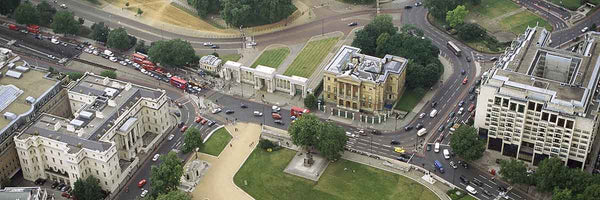Celebrating the 200th Anniversary of The Battle of Waterloo
To commemorate the 200th Anniversary of The Battle of Waterloo we have released a limited edition pocket square of The Duke of Wellington.
 Product Link: The Duke of Wellington Commemorative Pocket Square
Product Link: The Duke of Wellington Commemorative Pocket Square
The Duke of Wellington
Arthur Wellesley, 1st Duke of Wellington, was born on the 1st May 1769 to an Anglo-Irish aristocratic family. By the time of his death in 1852 he was a national hero with a glittering military and political career, and was dignified with the last heraldic state funeral to be held in Britain.
Wellington was commissioned to the British Army in 1787 and promoted to Field Marshal by 1813; during this period he had successfully led the allied forces to victory against the French at the Battle of Vitoria. On the now famous date of 18 June 1815 during The Battle of Waterloo, Wellington led one of the allied armies that eventually defeated Napoleon. This was to be his grandest victory, and etch his name firmly into British military history.
The Battle
The Battle of Waterloo was fought on Sunday the 18th of June 1815, near Waterloo in present-day Belgium. The Seventh Coalition which comprised of an Anglo-allied army under the command of the Duke of Wellington combined with a Prussian army commanded by Gebhard von Blucher, came up against the French army commanded by Napoleon. After the Prussian army suffered a defeat two days earlier by the French, Wellington determined that if the regrouped Prussian army was able to march to his support he could take on Napoleon directly. Sensing the threat, Napoleon attacked Wellington's army before he could create a co-ordinated attack with his allies. Wellington was able to withstand repeated French attacks until the Prussians arrived, at which point Wellington counter attacked and defeated the French army and effectively ended Napoleon's rule as Emperor of the French. According to Wellington, the battle was 'the nearest-run thing you every saw in your life'. For a detailed account of the battle see the following Wikipedia page Battle of Waterloo.
He returned to England a victorious commander and settled in the grand Apsley House in 1817. Here he began a detailed refurbishment and rebuilding programme, transforming it into the decadent neo-classical Regency residence that still stands today. It is one of the only preserved examples of an aristocratic townhouse of this period and stands alone in a corner of Hyde Park, an impressive location that was once known as Number One, London. The culmination of the refurbishing programme was the completion of Waterloo Gallery in 1830. It is here where Wellington held renowned annual banquets to celebrate the early anniversaries of the battle until his death in 1852. In 1947 the 7th Duke of Wellington gave the house over to the nation, although to this day Apsley House remains a residence of the 9th Duke of Wellington and stands as a national shrine to the victory of Waterloo.

After retiring from a splendidly successful military career Wellington entered politics; he was appointed Prime Minister in 1828, holding this post until 1830 and remained an active statesman for the duration of his life.
Battle Commissions
The period after the Battle of Waterloo ushered in a succession of commissions from King George IV to celebrate - in art, architecture and sculpture - the generals and heroes who had played pivotal roles in the victory. Opposite Apsley House sits Wellington Arch, opened in 1825 and built as a celebration of the Duke of Wellington’s success at Waterloo. It is crowned by the largest bronze sculpture in Europe, depicting the Angel of Peace descending on the ‘Quadriga’ – or four-horsed chariot – of War.
This sculpture demonstrates vividly the value the nation placed on Wellington’s participation in the battle, and shows him as a protector of peace. The legend that follows the Duke considers him instrumental in ending the series of wars that had crippled Europe during the 18th and 19th century. Between the Battle of Waterloo and the Crimean War, Europe enjoyed half a century of peace due to Napoleon’s defeat. It is the essence of peace and the stability that Wellington afforded the British people, which is most well remembered and celebrated today.
This year marks the 200th anniversary of the Battle of Waterloo, hailing in a succession of national events that will commemorate The Iron Duke. Click here to see some of the upcoming events 200th Anniversary Celebrations.


